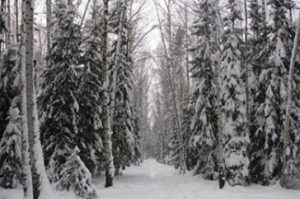UNH Researchers Find Northern Forests Have Lost Crucial Cold, Snowy Conditions
By University of New Hampshire
10/3/2019

Photo Credit: University of New Hampshire
DURHAM, N.H.—As the popular saying goes, “winter is coming,” but is it? Researchers at the University of New Hampshire have found clear signs of a decline in frost days, snow covered days and other indicators of winter that could have lasting impacts on ecosystems, water supplies, the economy, tourism and human health.
“Winter conditions are changing more rapidly than any other season and it could have serious implications,” said Alexandra Contosta, research assistant professor at UNH’s Earth Systems Research Center. “Whether precipitation falls as snow or rain makes a big difference, whether you’re talking about a forest stream, a snowshoe hare or even a skier.”
In their study, recently published in the journal Ecological Applications, the researchers looked at the last 100 years of weather station data from northern forests across the United States and Canada and the impacts on ecosystems and people. They found a significant decline in “frost days,” when minimum temperatures dip below freezing, and “ice days,” when maximum temperatures never rise above freezing.
Read more here: https://www.unh.edu/unhtoday/news/release/2019/10/03/unh-researchers-find-northern-forests-have-lost-crucial-cold-snowy